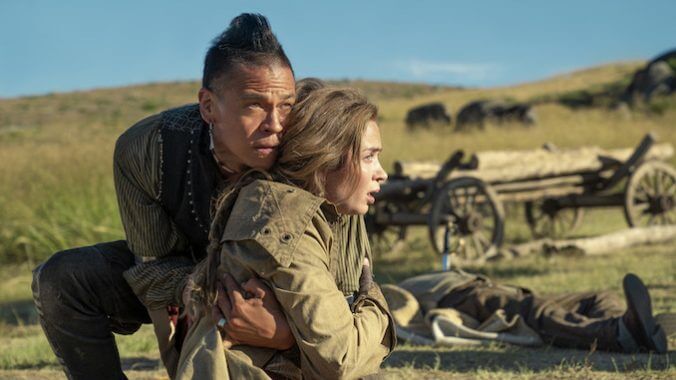Emily Blunt and Chaske Spencer Discuss Survival and Connection in The English
Photo courtesy of Prime Video
While most Westerns tend to follow one man’s heroic journey, The English decides to place a woman at the forefront. Emily Blunt—who also serves as an executive producer—stars as Lady Cornelia Locke, a wealthy Englishwoman seeking revenge against the man she believes to have killed her child. She meets Eli Whipp (Chaske Spencer), a Pawnee ex-army scout on his own quest towards claiming land that has been promised to him, though is getting repeatedly denied due to the color of his skin. As the two travel together, they find themselves joined against an array of bloody conflict, as well as finding connection in their shared pasts.
During a recent press junket, Paste sat down with leads Emily Blunt and Chaske Spencer to discuss The English, building the core love story, and bringing Blick’s characters to life.
Note: This interview has been lightly edited for length and clarity.
![]()
Paste: What attracted each of you to your character in The English? Why was this someone you wanted to bring to life on screen?
Emily Blunt: I fell madly in love with [Cornelia] and I love a character with a secret and she certainly has one, how much she withholds on this epic adventure she goes on. I found her endlessly surprising. She shows up in the Wild West like the feminine ideal and quickly reveals herself to be a force to be reckoned with. She’s like the damsel-not-in-distress, and I really liked that about her. I was gripped immediately. I thought the characters were so rich and so nuanced and modern somehow, within this epic landscape that they’re working in. They felt modern and the relationship [between Eli and Cornelia], their love story felt modern. I loved it.
Chaske Spencer: I have to go on what… [pause] I almost called you Cornelia [laughs].
Blunt: [Laughing] I imagined you preferred if she was my character at all times.
Spencer: …What Emily had said. It was the weight of the story that really intrigued me. Eli, I’ve never played a character like that, so I was really looking forward to seeing how far I could go with that. I love the chemistry between the two, the love story between the two. I loved how their dialogue, each scene was a little more peek into each character, a little crack into each character and I think that the audience will see that and also, I think they’ll be rooting for them as well as they go on this adventure of life, death, all that. I think that’s what really brought me into the world of what Hugo built.
Paste: You touched upon this blooming love story between Eli and Cornelia. Their connection that deepens through to the end is such an integral part to the series. How did you guys go about developing that relationship with one another?
Blunt: I think it felt very natural for us. We had such incredible material to work with. I think the space between them was so riveting to me. It’s what they don’t say to each other that keeps you leaning in and kept me leaning into his character and his into mine. I think even though their relationship at that point would be considered outside of the social norms, what I loved about it was that all that mattered to them was to survive. They needed each other desperately to survive. I think it came quite naturally for Chaske and I, we both saw the scenes very similarly. We wanted to play them, our approach was very in tandem, I felt. We sort of saw the scenes in a same way and so Hugo could just step back and let us play with them and I loved it.
-

-

-

-

- Curated Home Page Articles By Test Admin October 21, 2025 | 3:10pm
-

- Curated Home Page Articles By Test Admin October 21, 2025 | 2:57pm
- Urls By Test Admin October 21, 2025 | 2:57pm
- Curated Home Page Articles By Test Admin October 21, 2025 | 2:55pm
-

-

-

-

-

-

-

-

-

-

-

-

-

-

-

-

-

-

-

-

-

-

-

-

-

-

-

-

-

-

-




































